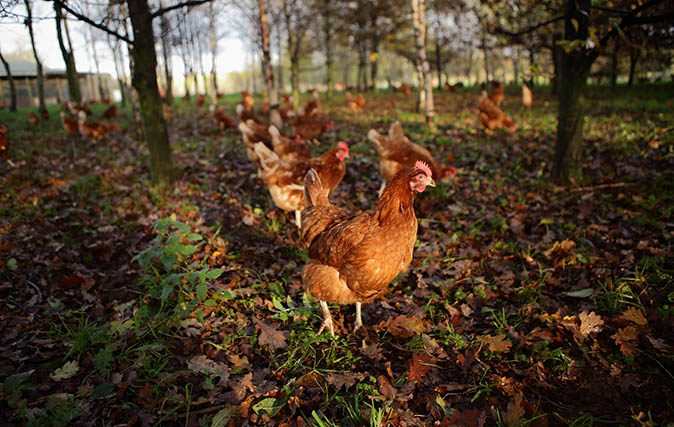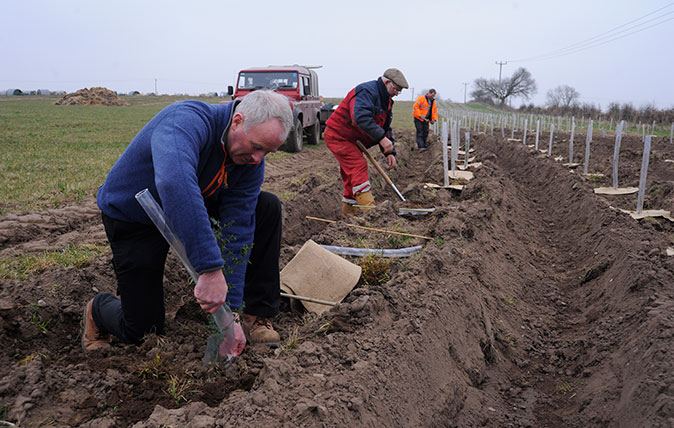Why farmers are growing to love trees – with the help of the Woodland Trust
Whether for tree planting on a farm or private land, the Woodland Trust can offer invaluable help in a number of ways, including tailored advice, grants and funding.


Over 20 years ago, David Brass made a decision that was to change his future, and that of his business, The Lakes Free Range Egg Company. In 1997 he decided to seek ways of improving his hens’ lifestyle by encouraging them to leave their barns.
Hens are woodland animals and they feel most secure in some form of shelter, so David planted wooded areas in which the hens could range and exhibit natural behaviours, such as foraging and dust bathing. Not only did his trees give him happier hens, but he quickly began to enjoy bigger benefits.
'The cost benefit of tree planting is one of the best in farming,’ he says.
‘We spend about £2,000 per hectare on planting trees, but this immediately improves the proportion of grade-A eggs produced by at least two per cent, meaning we can achieve payback in just six months.’
David’s planting schemes were self-funded, but help is now at hand for farmers who would like to reap the rewards of large-scale tree planting.

Whether for tree planting on a farm or private land, the Woodland Trust can offer invaluable help in a number of ways, including advice and funding.
After visiting any potential site, the Trust will help design the tree planting and select the most appropriate species mix before completing a bespoke site report, after which it will assign a dedicated project officer to help guide the application from start to finish.
Sign up for the Country Life Newsletter
Exquisite houses, the beauty of Nature, and how to get the most from your life, straight to your inbox.
Perhaps most welcome of all is the fact that the Woodland Trust will contribute at least 60 percent of the cost of the trees and help with their protection. Or if a contractor is used for the planting, it will pay 50% of the costs.
But the financial gains are just one of the benefits of tree-planting. Perhaps more than most, farmers and landowners have a natural interest in doing what’s best for nature, and they recognise the many ways the environmental benefits gained from an abundance of trees.
When Nottinghamshire arable farmer Richard Thomas saw his farmland disappearing before his eyes, he realised tree-planting was one course of action. ‘Strong winds were stripping valuable top soil from my land, while intensive rainfall was washing away the most fertile soil,’ he says. So he planted 7,550 trees over just three hectares with help and advice from the Woodland Trust, which also subsidised the cost of the trees and guards.
‘Now, during heavy rain, the trees encourage infiltration and also prevent the water causing damage, plus in strong winds they act as a barrier. And there’s an added benefit – in years to come, when the trees need thinning, we’ll have woodfuel to help feed our biomass burner.’
For more information on the MOREwoods scheme call 0330 333 5303 or complete the online enquiry form at www.woodlandtrust.org.uk.


Credit: Guardians of the Forest, Llanrhychwyn, Snowdonia, Wales ©Simon Baxter / Landscape Photographer of the Year
A walk in the woods: Tranquility, beauty, and a 500,000-year-old connection to our ancestors
John Lewis-Stempel appreciates the calm tranquillity of woodland as he wanders through his own treasured Cockshutt Wood.
-
 'To exist in this world relies on the hands of others': Roger Powell and modern British bookbinding
'To exist in this world relies on the hands of others': Roger Powell and modern British bookbindingAn exhibition on the legendary bookbinder Roger Powell reveals not only his great skill, but serves to reconnect us with the joy, power and importance of real craftsmanship.
By Hussein Kesvani
-
 Spam: The tinned meaty treat that brought a taste of the ‘hot-dog life of Hollywood’ to war-weary Britain
Spam: The tinned meaty treat that brought a taste of the ‘hot-dog life of Hollywood’ to war-weary BritainCourtesy of our ‘special relationship’ with the US, Spam was a culinary phenomenon, says Mary Greene. So much so that in 1944, London’s Simpson’s, renowned for its roast beef, was offering creamed Spam casserole instead.
By Country Life